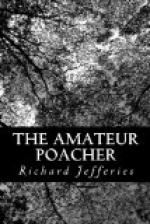The reason why the walnuts are put in exposed places, on the slope of a rise, with open aspect to the east and north, is because the walnut is a foolish tree that will not learn by experience. If it feels the warmth of a few genial days in early spring, it immediately protrudes its buds; and the next morning a bitter frost cuts down every hope of fruit for that year, leaving the leaf as black as may be. Wherefore the east wind is desirable to keep it as backward as possible.
There was a story that the stock of this gun had been cut out of a walnut tree that was thrown on the place by my great-grandfather, who saw it well seasoned, being a connoisseur of timber, which is, indeed, a sort of instinct in all his descendants. And a vast store of philosophy there is in timber if you study it aright.
After cleaning the gun and trying it at a mark, the next thing was to get a good shot with it. Now there was an elm that stood out from the hedge a little, almost at the top of the meadow, not above five-and-twenty yards from the other hedge that bounded the field. Two mounds could therefore be commanded by any one in ambush behind the elm, and all the angular corner of the mead was within range.
It was not far from the house; but the ground sank into a depression there, and the ridge of it behind shut out everything except just the roof of the tallest hayrick. As one sat on the sward behind the elm, with the back turned on the rick and nothing in front but the tall elms and the oaks in the other hedge, it was quite easy to fancy it the verge of the prairie with the backwoods close by.
The rabbits had scratched the yellow sand right out into the grass—it is always very much brighter in colour where they have just been at work—and the fern, already almost yellow too, shaded the mouths of their buries. Thick bramble bushes grew out from the mound and filled the space between it and the elm: there were a few late flowers on them still, but the rest were hardening into red sour berries. Westwards, the afternoon sun, with all his autumn heat, shone full against the hedge and into the recess, and there was not the shadow of a leaf for shelter on that side.
The gun was on the turf, and the little hoppers kept jumping out of the grass on to the stock: once their king, a grasshopper, alighted on it and rested, his green limbs tipped with red rising above his back. About the distant wood and the hills there was a soft faint haze, which is what Nature finishes her pictures with. Something in the atmosphere which made it almost visible: all the trees seemed to stand in a liquid light—the sunbeams were suspended in the air instead of passing through. The butterflies even were very idle in the slumberous warmth; and the great green dragon-fly rested on a leaf, his tail arched a little downwards, just as he puts it when he wishes to stop suddenly in his flight.




